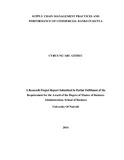| dc.description.abstract | Supply Chain Management encompasses the planning and management of all activities
involved in sourcing and procurement. It includes coordination and collaboration with
channel partners such as suppliers, intermediaries, third-party service providers and
customers. In essence, SCM integrates supply and demand management within and
across companies. Organizations adopt numerous business improvement methodologies
to improve their performance. As competition intensifies, so do the challenges associated
with getting a product or service to the right place at the right time at the lowest delivered
total cost. Service industry has begun to realize the potential benefits and importance of
strategic and cooperative buyer-supplier relationships. With the purpose of managing the
supply chain actions for realizing improvement in enterprise performance, it is necessary
to improve the planning and management of activities such as materials planning,
inventory management, capacity planning, and logistics. SCM practices in the banking
industry have been unable to display consistency and stability in performance. They have
frequently experienced costly discontinuities in the current dynamic markets and vastly
changing technological environments. They are also inflexible and susceptible to
disruption since they are unable to swiftly and suitably respond to emerging international
protocols, certification requirements, and to governmental and regulatory changes. The
study looked at supply chain management practices and performance of commercial
banks in Kenya. Specific objectives were to: establish supply chain management
practices used in the banking industry in Kenya; establish the impact of SCM to
performance of the banks; and establish the challenges of supply chain management
practices faced by the banking industry in Kenya. The study adopted descriptive research
design in order to investigate and understand the application of supply chain management
in the service industry. The population of the study was all the 43 commercial banks
operating in Kenya. A semi structured questionnaire was used to collect primary data.
The study used descriptive statistics to analyze objectives one and three while inferential
statistics was conducted on objective two. The study found that three variables out of the
six, namely Supplier Relationships, Reverse logistics, and Outsourcing were found to
have strong statistically significant relationships with performance. The other three
variables, namely Information Technology, Green supply chain practices and Lean
Suppliers were found to have weak relationships which were not statistically significant.
The study concluded that Uncertainty in terms of demand, Political interference in SCM,
Bulky materials to be transported, Uncertainty in terms of supplies, Lack of financial
resources and inefficient tender handling are challenges facing commercial banks in
Kenya. The study recommended that commercial banks be encouraged to enhance
adoption of SCM practices since they have the potential of improving their performance. | en_US |

